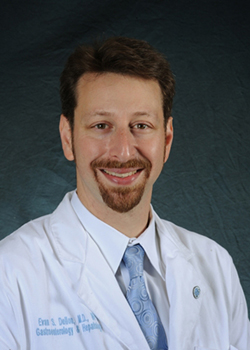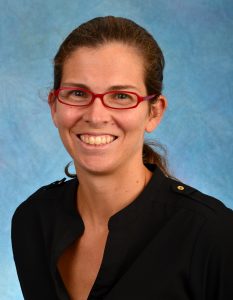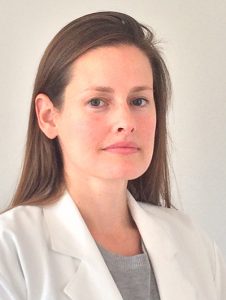
Evan Dellon, MD
Dr. Evan Dellon’s research focuses on eosinophilic esophagitis (EoE), a chronic allergy/immune-mediated esophageal disease. This condition is characterized by symptoms of esophageal dysfunction and a marked eosinophilic infiltration in the esophageal mucosa, which leads to esophageal strictures and other structural changes. Symptoms of EoE include dysphagia and food impaction in adults and adolescents, and heartburn, abdominal pain, failure to thrive, and food intolerance in children. EoE has only been recognized over the past two decades, but has rapidly risen in incidence and prevalence at rates that are outpacing increased awareness and recognition of the condition. Because this is a new condition, it has been exciting to study and contribute to the growth of the field.
Dr. Dellon has a wide research portfolio, with ongoing studies related to the epidemiology, pathogenesis, diagnosis, and treatment of eosinophilic esophagitis. The overall goal of his research is to improve the lives of patients with EoE by learning how to better diagnose, treat, and monitor the condition. He has collaborations with investigators across a number of disciplines including epidemiology, allergy, pathology, and nutrition. One current project is evaluating a minimally invasive tissue sampling technique called the cytosponge for diagnosis and monitoring of EoE. This device is a spherical cytology brush contained in a capsule that is attached to a string. Patients swallow the capsule, the sponge deploys, and then as it is pulled back through the esophagus it obtains the equivalent of an esophageal biopsy sample. Another project, which uses the UNC EoE Patient Registry and Biobank, is examining whether gene expression can be used to diagnose EoE and monitor treatment response.
In addition, there are a number of active clinical trials of EoE treatment. These studies include: a comparison of two swallowed, or “topical” steroids, budesonide and fluticasone; a novel budesonide suspension; two novel biologic agents (anti-IL-13 and anti-IL-4); and several evaluations of dietary elimination therapies. Dr. Dellon has received research funding from NIH, the American College of Gastroenterology, the American Gastroenterological Association, the CURED Foundation, the UNC Center for GI Biology and Disease, NC TraCS and the UNC Office of Research, and industry to study EoE. He was also the recipient of the Ruth and Phillip Hettleman Prize for Artistic and Scholarly Achievement in 2012.
Listen to Dr. Dellon’s recent podcast with Dr. Falk on EoE.
Millie Long, MD, MPH

Dr. Millie Long studies inflammatory bowel diseases (IBD), including Crohn’s disease (CD) and ulcerative colitis (UC). Dr. Long completed a Masters in Public Health in epidemiology during her gastroenterology (GI) fellowship, and also completed a fellowship in preventive medicine and advanced training in IBD at UNC. She conducts health services and clinical outcomes research and also participates in randomized controlled trials to assess the efficacy and safety of therapies used in the treatment of CD and UC.
Her outcomes research has focused the prevention of complications associated with medications used for the treatment of IBD. Her prior work has estimated risks of non-melanoma skin cancer, melanoma, herpes zoster, and pneumonia associated with specific IBD therapies. Based on this work, preventive recommendations for sunscreen use and vaccinations in IBD patient populations are now standard of care. More recently, she has worked with Dr. Robert Sandler and Dr. Michael Kappelman to develop an internet-based cohort called CCFA Partners. This cohort, initially launched in 2011, has enrolled over 14,000 patients with IBD. With funding from the Crohn’s and Colitis Foundation of America and the Patient Centered Outcomes Research Institute (PCORI), the cohort has been transformed into a patient powered research network (PPRN). The goal of the PPRN is to understand the role of various risk factors and interventions on patient reported outcomes in IBD. The research agenda is driven by patients, who propose and vote on important research questions to answer in the cohort. CCFA Partners uses measures from the National Institutes of Health Patient Reported Oucome Measurement Information System (NIH-PROMIS) to follow important outcomes in IBD patients over time; such as sleep, pain interference, depression, anxiety and fatigue.
When not working on health outcomes research or conducting clinical trials, Dr. Long sees patients in the UNC Inflammatory Bowel Diseases Center of Excellence. Dr. Long also leads the clinical epidemiology curriculum at the school of medicine and is active in a number of GI societies. She is Chair of the Crohn’s and Colitis Foundation of America Professional Education committee, a member of the American College of Gastroenterology Research committee and the American Gastroenterological Association Maintenance of Certification Task Force. Outside of work, Dr. Long enjoys running, swimming, and spending time with her family.
A list of relevant publications can be found on PubMed.
Shehzad Z. Sheikh, MD, PhD

Dr. Shehzad Z. Sheikh’s research focuses on understanding the pathogenesis of the human inflammatory bowel diseases (IBDs), Crohn’s disease (CD) and ulcerative colitis (UC). The rationale for his research is rooted in genome wide association studies that have linked many single nucleotide polymorphisms (SNPs) within genes of the innate immune system to IBD. However, which of these SNPs is causal with respect to IBD pathogenesis is unknown. Dr. Sheikh hypothesizes that genetic variation in IBD affecting chromatin structure at these SNPs results in important functional consequences on gene regulation.
Dr. Sheikh has cross-trained in disciplines that position him to bridge the fields of mucosal immunology, genomics and clinical IBD. After completing his PhD in Microbiology & Immunology, a clinical sub-sub-specialty fellowship in IBD (after a residency in Internal Medicine and a sub-specialty gastroenterology fellowship), he trained in high throughput genomics at the Carolina Center for Genome Sciences. With joint research appointments in the Department of Genetics and Molecular Biology Dr. Sheikh is uniquely qualified to identify and functionally characterize the functional significance of genes implicated in IBD pathogenesis.
Currently, Dr. Sheikh’s research team at UNC focuses on: 1) characterizing quantitatively how the regulation of genome accessibility occurs and how it is coordinated with the underlying layers of information encoded in DNA; 2) the influence of variations in chromatin, RNA, small RNA and DNA nucleotide sequences on the phenotype of human IBD as individual variations in disease extent, severity and response to therapy; and 3) developing novel therapies for IBD.
Dr. Sheikh’s research group is highly collaborative funded through various foundations (Crohn’s and Colitis Foundation of America, American Gastroenterological Association, Broad Medical Research Program, Helmsley Charitable Trust) and the NIH (NIDDK and NIEHS). Results of work from his lab have resulted in integration of ‘multi-omics’ data including genome wide sequencing studies of chromatin, RNA, small RNA and microbial 16S rRNA with IBD disease phenotype. Dr. Sheikh’s background in genomics combined with expertise in mucosal immunology and clinical IBD has allowed him to establish and direct the Human Tissue and Genomics Core at UNC. As a Co-investigator this is an integral part of a program project grant (P01) led by Dr. Balfour Sartor, through which his laboratory receives generous funding to conduct molecular studies in human IBD.
Ian Carroll, PhD

Ian Carroll attended University College Dublin as an undergraduate studying biotechnology. He then trained in molecular biology at Trinity College Dublin, where, under the mentorship of Prof. Cyril J. Smyth, he investigated the genetic diversity of Helicobacter pylori isolates in different human populations, asking how this organism can persist in the harsh niche of the stomach. He found the host-microorganism interaction fascinating and decided to pursue a career in this aspect of microbiology.
As a postdoctoral fellow of Dr. Deborah Threadgill in the Department of Genetics at UNC-Chapel Hill he designed an experiment to test the effect of a genetically modified probiotic bacteria in a mouse model of inflammatory bowel disease. Collaborating also with Dr. Todd Klaenhammer at North Carolina State University they found that inserting a probiotic into Lactobacillus gasseri reduced inflammation in the bowel. At this point it was unclear if the probiotic expressed by the lactobacillis worked directly to reduce oxidative stress or if L. gasseri had indirect effects on other intestinal microorganisms.
The specific goals of Dr Carroll’s research team are to determine the mechanisms through which specific members of the intestinal microbiota influence gastrointestinal physiology, nutrition, behavior, and weight regulation. For instance, working with Dr. Yehuda Ringel and Dr. Balfour Sartor, he considered the role of the intestinal microbiota in intestinal diseases such as irritable bowel syndrome (IBS) and inflammatory bowel diseases (IBD). Working with Dr. Cynthia Bulik he focuses on the role that enteric microbial communities play in the pathogenesis and maintenance of anorexia nervosa (AN). My research philosophy is based on unfettered collaborations that draw from diverse fields resulting in a multi-disciplinary approach to a scientific question. Ultimately, he hopes that his wide collaboration across diverse fields will result in a multidisciplinary understanding of host-microbe interactions, where the knowledge gained will enhance health and reduce illness.
Anne Peery, MD, MSCR

Dr. Anne Peery is a gastroenterologist with a research focus on understudied and common gastrointestinal diseases that have a significant impact on quality of life and healthcare costs. She earned her medical degree at the UNC School of Medicine, where she also completed her internship, residency and fellowship training. During fellowship training, she also earned her master’s degree at the UNC School of Public Health. She joined the faculty at the University of North Carolina in 2013. For the last three years, she has been a scholar on the North Carolina Translational & Clinical Sciences Institute (KL2 TR001109) mentored scholars program.
Dr. Peery focuses on benign conditions of the colon, including diverticular disease and hemorrhoids. Despite the extremely common nature of these conditions, there is little scientifically-based evidence to guide the care of patients with these commonly-encountered conditions. Indeed, most of the algorithms of care f these diseases are governed by opinions and best guesses as to good practice rather than hard evidence. Dr. Peery’s research has challenged long-held beliefs about risk factors for uncomplicated diverticulosis and raised new questions about a long neglected disease. She recently served as a content expert and co-authored the guideline for the management of acute diverticulitis for the American Gastroenterological Association. She also co-authored a commentary that addressed a controversial recommendation generated by the guideline.
Dr. Peery and her colleagues here at the University of North Carolina have also collaborated to publish reports detailing the current state of gastrointestinal, liver and pancreatic morbidity, mortality, and cost in adults in the United States. They gathered data from several complementary national databases to achieve this objective and documented the many ways that gastrointestinal diseases are a source of substantial burden and cost in the United States. This work has been cited hundreds of times.
Dr. Peery has two young children and has written on work-life balance.